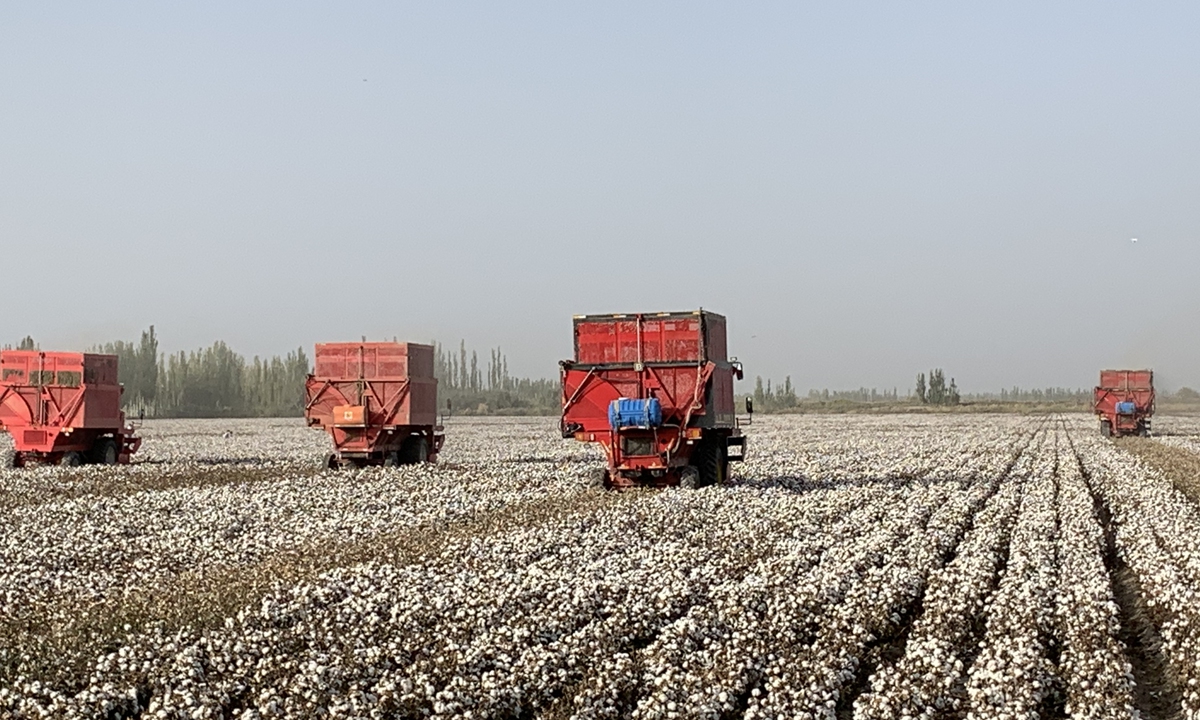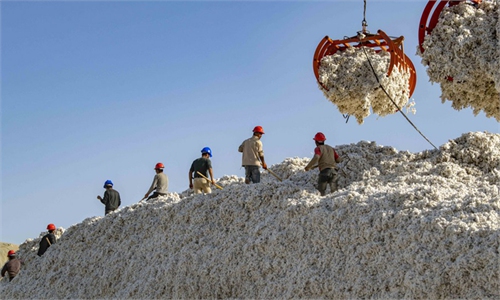Western crackdown inspires Xinjiang cotton industry to rise
Local farmers earn more with bumper harvest, price hikes

A view of a cotton farm in Xinjiang on Friday Photo: Li Xuanmin/GT
With white cotton blossoming in the fields and fluttering in the air like snowflakes, Northwest China's Xinjiang Uygur Autonomous Region, the country's largest cotton production base that accounts for over 85 percent of the nation's output, is embracing another bumper cotton harvest season this month.
This is the first picking season since the West launched large-scale boycotts and smears against Xinjiang cotton over claims of "forced labor."
It has been half a year since the targeted vicious attacks, but cotton farmers in Xinjiang can easily recall the outrage they felt over groundless accusations at that time. But now, they are even more determined to bolster the industry.
While cotton farming remains unaffected, with output expected to reach a new high, changes have been slowly taking place, in particular with growing confidence from downstream to upstream industries and an aspiration to show the world how Xinjiang cotton smashes Western attacks and conspicuously rises to the top.
In Xinjiang's Aksu Prefecture in October, the endless cotton fields across the roads and the roaring cotton machines that run in full swing is an impressive scene for visitors.
The cotton planting area in Xinjiang has reached 37.18 million mu (2.47 million hectares) and output is expected to hit 5.2 million tons, slightly up from the 5.16 million tons last year.
Local officials in Aksu told the Global Times that the cotton yield per mu is expected to reach 430 kilograms this year, in tandem with last year, despite more extreme weather conditions like hail and the early arrival of a cold wave.
"Thanks to mechanization and the application of intelligent agricultural technologies, the cotton yield has been jumping significantly in recent years, from only 200 kilograms per mu," Fan Xinbin, who manages the cotton business of Lihua Agriculture in Shaya county, told the Global Times over the weekend.
The joy of the plentiful harvest is also on vivid display through the bright smiles of thousands of local cotton farmers.
"In terms of revenue per mu, I'm able to earn several hundred yuan more compared with last year as cotton prices have kept rising. Last year, the cotton was purchased at prices of 7 to 8 yuan a kilogram. But this year, it was bought for more than 10 yuan," Yimin Anayeti, a cotton farmer in Shaya who owns 1,000 mu of cotton fields, told the Global Times on Friday.
Anayeti estimated that he is able to earn 3 million yuan in revenue through selling cotton.
"The vicious boycotts by some Western fashion brands in April did not dampen local farmers' enthusiasm and initiative to seed the crops. We also adjusted the local subsidy mechanism to offer more reassurance to farmers. They're able to receive 400 yuan per mu in subsidies this year," Liu Guisheng, a Shaya official, told the Global Times on Friday.
In April, some Western brands, including Adidas, Nike and H&M, boycotted Xinjiang cotton, following a call from the Better Cotton Initiative (BCI) that cited alleged "forced labor" in Xinjiang. It sparked a fierce backlash in China as Chinese consumers rushed to buy homegrown brands that use Xinjiang cotton to voice their support.
"Although exports of most Xinjiang textile and yarn products have stalled, our sales in the domestic market have more than doubled thanks to this endorsement. Xinjiang cotton has become a calling card," a manager of a textile company in Aksu surnamed Zhang, told the Global Times on Saturday.
Zhang added that to cope with potential impact, his company is also developing more high-end cotton products to diversify its sales.
"The boycott in fact marked a psychological watershed for Xinjiang's cotton industry, after which our will to fight became aroused and united. We want to build up our own world-leading clothing brands and are determined to prove the high quality of Xinjiang cotton," Zhang said.
Zhang's sense of mission is also widely shared among Xinjiang cotton farmers, some of whom became excited when talking about the future of their cotton careers.
"I have a deep understanding of the crops that I planted, and that's why I have confidence in Xinjiang cotton. The Western slander will not frighten or deter us, and I will work even harder from now on," Yusu Pujiang, a 40-something Uygur cotton farmer in Aksu, told the Global Times.
Pujiang added that now, some Xinjiang cotton farmers often shares videos of cotton farming and picking on social media platforms, in an attempt to "let the outside world know them better."


